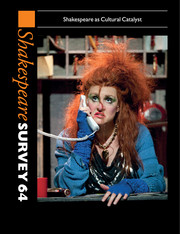Book contents
- Frontmatter
- CONTENTS
- ILLUSTRATIONS
- The Commercial Bard: Business Models for the Twenty-First Century
- International Innovation? Shakespeare as Intercultural Catalyst
- Brand Shakespeare?
- Global Shakespeare 2.0 and the Task of the Performance Archive
- An International Database of Shakespeare on Film, Television and Radio
- ‘Sounds and Sweet Airs’: Music in Shakespearian Performance History
- Using Shakespeare with Memes, Remixes and Fanfic
- ‘Pretty Much how the Internet Works’; or, Aiding and Abetting the Deprofessionalization of Shakespeare Studies
- Catalysing What? Historical Remediation, the Musical, and What of Love's Labour's Lasts
- Kabuki Twelfth Night and Kyogen Richard III: Shakespeare as a Cultural Catalyst
- The Sonnets as an Open-Source Initiative
- ‘A Stage of the Mind’: Hamlet on Post-War British Radio
- Post-Textual Shakespeare
- I am What I am Not: Identifying with the Other in Othello
- Desdemona's Book, Lost and Found
- Non-Catalyst and Marginal Shakespeares in the Nineteenth-Century Revival of Catalan-Speaking Cultures
- Shakespeare, Mácha and Czech Romantic Historicism
- An Irish Catalysis: W. B. Yeats and the Uses of Shakespeare
- François-Victor Hugo and the Limits of Cultural Catalysis
- ‘You Taught me Language’: Shakespeare in India
- There is Some Soul of Good: An Action-Centred Approach to Teaching Shakespeare in Schools
- The Royal Shakespeare Company as ‘Cultural Chemist’
- Shakespeare at the White Greyhound
- Dark Matter: Shakespeare’s Foul Dens and Forests
- What We Hear; What we see: Theatre for a New Audience's 2009 Hamlet
- Narrative of Negativity: Whig Historiography and the Spectre of King James in Measure for Measure
- Québécois Shakespeare goes Global: Robert Lepage's Coriolan
- Endless Mornings on Endless Faces: Shakespeare and Philip Larkin
- Shakespeare Performances in England 2010
- Professional Shakespeare Productions in the British Isles, January–December 2009
- The Year’s Contribution to Shakespeare Studies
- INDEX
- References
An Irish Catalysis: W. B. Yeats and the Uses of Shakespeare
Published online by Cambridge University Press: 28 November 2011
- Frontmatter
- CONTENTS
- ILLUSTRATIONS
- The Commercial Bard: Business Models for the Twenty-First Century
- International Innovation? Shakespeare as Intercultural Catalyst
- Brand Shakespeare?
- Global Shakespeare 2.0 and the Task of the Performance Archive
- An International Database of Shakespeare on Film, Television and Radio
- ‘Sounds and Sweet Airs’: Music in Shakespearian Performance History
- Using Shakespeare with Memes, Remixes and Fanfic
- ‘Pretty Much how the Internet Works’; or, Aiding and Abetting the Deprofessionalization of Shakespeare Studies
- Catalysing What? Historical Remediation, the Musical, and What of Love's Labour's Lasts
- Kabuki Twelfth Night and Kyogen Richard III: Shakespeare as a Cultural Catalyst
- The Sonnets as an Open-Source Initiative
- ‘A Stage of the Mind’: Hamlet on Post-War British Radio
- Post-Textual Shakespeare
- I am What I am Not: Identifying with the Other in Othello
- Desdemona's Book, Lost and Found
- Non-Catalyst and Marginal Shakespeares in the Nineteenth-Century Revival of Catalan-Speaking Cultures
- Shakespeare, Mácha and Czech Romantic Historicism
- An Irish Catalysis: W. B. Yeats and the Uses of Shakespeare
- François-Victor Hugo and the Limits of Cultural Catalysis
- ‘You Taught me Language’: Shakespeare in India
- There is Some Soul of Good: An Action-Centred Approach to Teaching Shakespeare in Schools
- The Royal Shakespeare Company as ‘Cultural Chemist’
- Shakespeare at the White Greyhound
- Dark Matter: Shakespeare’s Foul Dens and Forests
- What We Hear; What we see: Theatre for a New Audience's 2009 Hamlet
- Narrative of Negativity: Whig Historiography and the Spectre of King James in Measure for Measure
- Québécois Shakespeare goes Global: Robert Lepage's Coriolan
- Endless Mornings on Endless Faces: Shakespeare and Philip Larkin
- Shakespeare Performances in England 2010
- Professional Shakespeare Productions in the British Isles, January–December 2009
- The Year’s Contribution to Shakespeare Studies
- INDEX
- References
Summary
In April 1901, W. B. Yeats was in Stratford-upon-Avon, staying at the Shakespeare Hotel, watching the Benson company perform the history plays in sequence, and reading criticism of the plays at the library of the Shakespeare Memorial Theatre. ‘I do not’, he wrote to Augusta Gregory, ‘even stop for Afternoon tea.’ This period of Shakespearian immersion resulted in two magazine articles, published in the Speaker, then subsequently reprinted as a single piece, under the title ‘At Stratford-on-Avon’, in the collection Ideas of Good and Evil (1903). In his letter to Gregory, Yeats observed that ‘The more I read the worse does the Shakespeare criticism become. And Dowden is about the climax of it.’ The ‘Dowden’ referred to here was, of course, fellow Irishman Edward Dowden, Professor of English at Trinity College Dublin from 1867 until his death in 1913, author of the highly successful Shakspere: A Critical Study of his Mind and Art, and inaugural general editor of the Arden Shakespeare.
Yeats and Dowden had a complex relationship. The professor had been an undergraduate at Trinity with Yeats's father, the painter John Butler Yeats, and they remained lifelong friends. Dowden offered much encouragement to the younger Yeats in the early days of his writing career, helping to convince the Dublin publishing firm of Sealy, Bryers and Walker to produce a pamphlet version of the poet's Mosada in 1886, and helping also to solicit subscriptions for the publication. When The Wanderings of Oisin was published in 1889, Dowden wrote to Yeats:
It gave me great pleasure to get your volume of poems, & to get it from yourself, & see it a fact accomplished, & last to read it from cover to cover. I do not think there is a page in it which has not its own beauty, & there is also a kind of unity in the whole book…A great many were already familiar to me, & I think it is a good sign of your quality that I remembered them so well.
- Type
- Chapter
- Information
- Shakespeare Survey , pp. 208 - 219Publisher: Cambridge University PressPrint publication year: 2011



